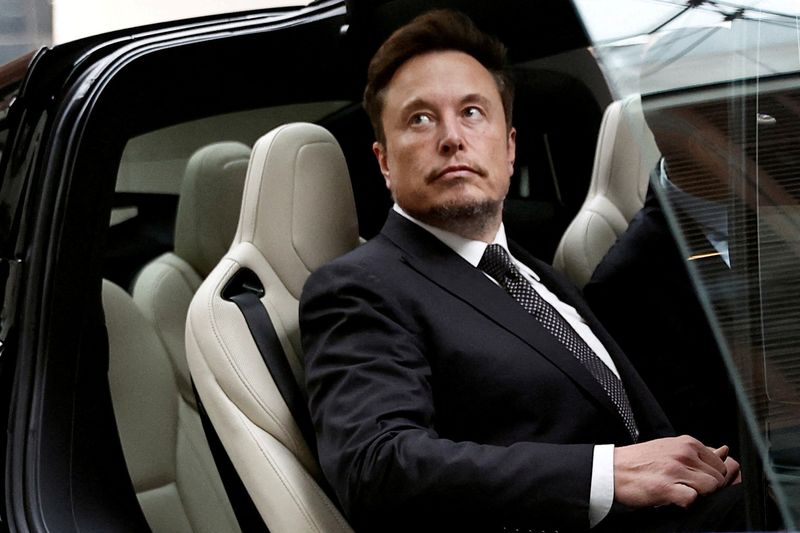By Joseph White and Ben Klayman
DETROIT (Reuters) - Detroit's automakers and the United Auto Workers will not be alone as they begin bargaining this week over wages and working conditions that will govern the shift to electric vehicles over the next several years.
Tesla (NASDAQ:TSLA) CEO Elon Musk and the automaker's increasingly profitable and efficient electric-vehicle factories will be shadow participants, just as Japanese automaker Toyota and its lean production system were for much of the past 30 years.
Tesla enjoys an operating-profit advantage over General Motors (NYSE:GM) and Ford that ranges from nearly $2,800 per vehicle for GM to $3,970 per vehicle for Ford, based on a Reuters analysis of financial results at each automaker.
Stellantis' North American operations last year out-earned all three in operating profit per vehicle, earning $8,365 per vehicle to beat Tesla's latest second-quarter figure by nearly $1,200. That is in part due to Stellantis North America's focus on combustion pickup trucks and Jeep SUVs that command hefty profit margins.
Looking forward, Detroit Three executives say new contracts with the UAW must allow them to be "competitive" as their U.S. operations shift to building EVs, which are money-losers for the legacy automakers now.
Stellantis CEO Carlos Tavares has warned a rapid shift to EVs forced by regulations is "beyond the limits" of what consumers can shoulder. Stellantis cited rising costs for moving to EVs when it announced plans to idle a Jeep factory in Belvidere, Illinois.
The Detroit manufacturers are expected to bring comparisons with Tesla to the bargaining table, people familiar with the process said.
"Tesla today plays the role of the Japanese and German automakers in the '80s," said Harley Shaiken, a labor professor at the University of California, Berkeley, who has followed the U.S. industry.
UAW President Shawn Fain, in a statement on Wednesday, put his own interpretation on the term "competitive."
"As we embark on this EV journey," he said, "we are constantly presented with the same tired script from the companies; that we must remain 'competitive,' which is nothing more than a continued race to the bottom in a quest to follow the lowest bidder to pay poverty wages."
TESLA'S COST ADVANTAGES
Tesla's U.S. factory workers are not unionized. Musk fought an effort by the UAW to organize Tesla's Fremont, California, factory. He posted a tweet in 2018 warning that workers could lose stock options if they joined the union, an action the National Labor Relations Board later ruled illegal.
Tesla workers earn about $45 an hour in wages and benefits, analysts said. That compares with about $64 to $67 an hour at UAW-represented Detroit Three operations.
The automakers do not detail the hours of labor that go in to building their vehicles - and those figures vary based on the different levels of vertical integration.
But using an estimate of about 30 hours of work to assemble a vehicle, Tesla would have a direct labor cost advantage of as much as $660 per vehicle over one of the Detroit Three.
That gap helps Tesla's ability to offer more features in its vehicles at a given price, or to cut prices without going into the red.
Hourly labor costs are just a slice of Tesla's overall superiority in EV profitability, an edge it is using to cut prices and gain share in the EV market.
Musk's comment on Wednesday that he could have Tesla's humanoid robot, Optimus, doing useful work in factories next year is the least of Detroit's problems.
Ford CEO Jim Farley has said Tesla enjoys a $2,000 advantage in distribution costs because it does not have dealers with whom it shares profit.
Tesla also has pioneered use of large "giga-castings" to replace multiple parts with single, cast metal pieces that save on production equipment and assembly time. Tesla executives in March outlined plans to cut production costs by as much as half with what they call "unboxed assembly," that could eliminate many of the steps on a traditional assembly line.
During the second quarter, Tesla pulled in $150 million to $250 million in U.S. battery production subsidies, and enjoyed a similar amount in lower costs for lithium and battery materials, Chief Financial Officer Zach Kirkhorn said on Wednesday on a conference call.
Taken together, Inflation Reduction Act production subsidies and battery material cost reductions boosted Tesla's second-quarter profit by $625 to $1,000 per vehicle, based on the company disclosures.
Tesla earned $5,000 in operating income per vehicle for the second quarter, according to company disclosures.

On a similar basis, Ford reported $3,220 per vehicle in the first quarter, while GM reported $4,400 per vehicle in overall pretax profit per vehicle for the first quarter.
GM and Ford report second-quarter financial results next week.